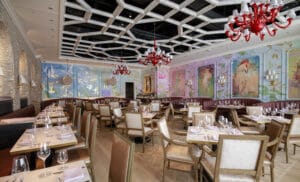
Chris Jamison, CEO of Boston-based COJE Management Group, said hotel locations such as his Coquette restaurant at the Omni Boston Hotel at the Seaport offer less risk than a typical restaurant deal. Photo courtesy of Richard Cadan
Rubbery chicken and a burger used to be de rigueur for menus at hotel restaurants, and discerning guests would consult with the concierge for somewhere else to spend a night on the town.
Today, that’s as easy as taking the elevator to the rooftop if you head to Contessa at The Newbury. Even a year after opening, it’s still harder to score a table at the Back Bay hotspot than it is to reserve a room. You’ll wait months for a reservation at The Langham’s lavish three-course Grana brunch. And for those thirsting after an experience at Gordon Ramsay’s Kitchen at the Mandarin Oriental – the first U.S. location for the celebrity chef’s concept – it’s a downright nightmare to get a dinner slot before the end of the year.
“These amenities are really adding value to the real estate,” said James O’Connell, who oversees hotel real estate brokerage across the Northeast as a principal at HREC Investment Advisors.
Bostonians’ preferences are a lot more elevated than they were when Marriott pioneered leasing its food and beverage space to now-shuttered sports pub Champions – and in some ways elevated quite literally.
“The Envoy started it all and now almost every new hotel design includes a rooftop [food and beverage] outlet. Seventy-five to 85 percent of the business on the F&B side of that hotel is coming from people who aren’t staying there” O’Connell said. “That upscale experience is huge.”
More than ever before in Boston, high-profile restaurants and hoteling go together like salt and pepper. Whether it’s brand recognition, increased food and beverage revenue while business travel is still down, or more stability for vendors who eschew risky leases, partnerships are a win-win, restaurateurs and hoteliers say.
Less Risk, More Return
Among them is Chris Jamison, CEO and Owner of COJE Management Group in Boston. Coquette at the new Omni Boston Hotel at the Seaport is the second sexy and successful hotel venture for Jamison, whose other foray – RUKA at The Godfrey – pulls diners into Downtown Crossing for more than commuting and shopping. While he does run other freestanding restaurants like Yvonne’s and Mariel, a lease requiring less capital lets him sleep better at night, he said.
“There’s less upfront risk for me [in a hotel deal], that’s a significant consideration,” Jamison said. “I don’t have a $4 million guillotine hanging over my head every day of the week, so it’s a bit safer. Having 1,000 rooms above us at the Omni is a real safety blanket.”

The Mandarin Oriental in Boston’s Back Bay is host to celebrity chef Gordon Ramsay’s newest venture, called Kitchen. It’s also Ramsay’s first in the United States. Photo courtesy of Mandarin Oriental Hotel Group
A bustling food-and-beverage outlet is also a boon for the Omni, whose location across from the Boston Convention and Exhibition Center faces challenges with Boston business travel still slow to rebound.
A bustling food-and-beverage outlet is also a boon for the Omni, whose location across from the Boston Convention and Exhibition Center faces challenges with Boston business travel still slow to rebound.
The pandemic was a pivotal time for Justin Urso to get strategic about costs so he could spend more time behind the stove than a calculator. The executive chef at The Dial and Blue Owl Rooftop Bar at Cambridge boutique hotel Sonder 907 Main opened both outlets just after COVID-19 vaccines became widely available.
“Our team works in conjunction with [Sonder] on a lot of property-specific items and can share costs,” like those to maintain common areas, Urso said. “That definitely helps. COVID has obviously changed how restaurants look at revenue, because they’re already running on tight margins.”
Nestled in an urban area between MIT and Harvard, Urso benefits from heavy foot traffic that also informs his approach to menu-planning, he said. Jamaican, Middle Eastern, Indian and Greek flavors are all imbued to “mirror the diversity of the neighborhood.”
While Boston and its environs have made huge progress in diversifying the hotel landscape and its culinary offerings, Jamison spilled the beans on his thoughts about Beantown.
“I think there’s an opportunity to create smaller, more lifestyle, high-energy cohesive hotel brands that don’t play it too safe – an amazing building, with a rooftop, a performing arts space, nightclub, two or three food outlets and a collaborative process that brings the right people to the table from the very beginning,” he said.
Jamison said most hotel blueprints include food and beverage space, but the specifications are already determined by the time operators reach out to restaurateurs about collaborating.
O’Connell said Jamison’s suggested approach may just be the secret sauce to kick the city’s dining scene up even more.
“Hospitality has proven that they’re not the experts in food and beverage operations. When you look at a profit and loss statement, typically a room’s profit runs around 73 percent and an F&B outlet runs between 10 and 18 percent,” he said. ‘Which would you rather focus on?”




 |
| 

